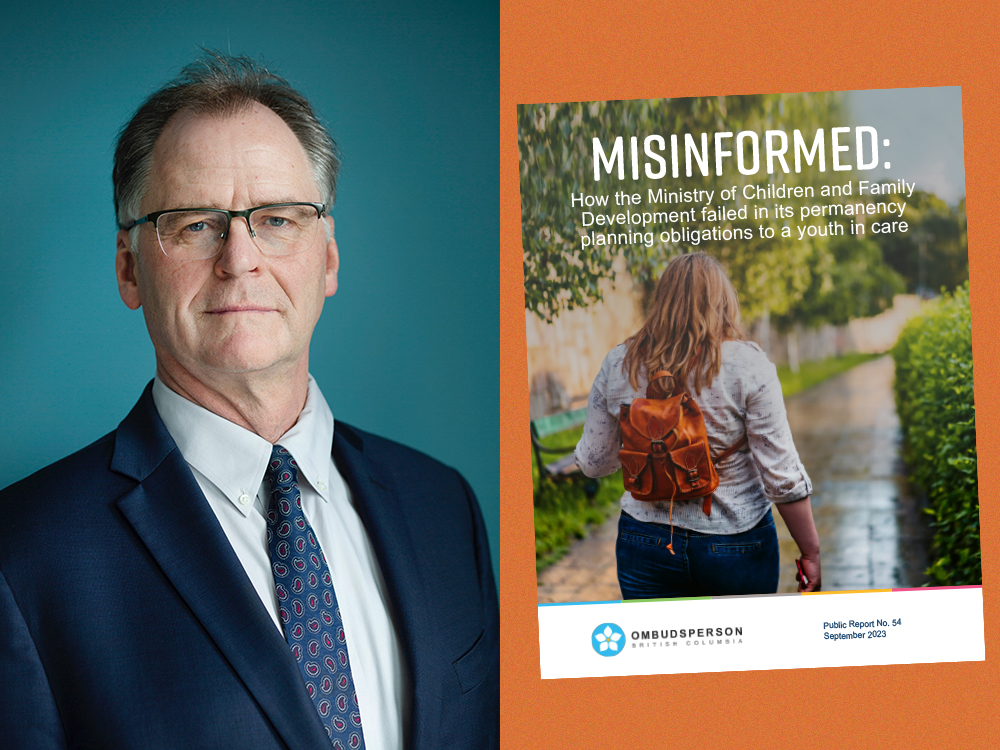A youth in government care was misled by BC’s Ministry of Children and Family Development, which also neglected to give her access to the legal advice it was required to offer, according to a new report.
Making matters worse, when Ombudsperson Jay Chalke asked the ministry to conduct an audit to look for other youth from care who may have been similarly misled or denied the right to independent legal advice, the ministry allegedly refused because, Chalke said, it “lacks the faith in its own record-keeping practices.”
The ombudsperson’s report, released yesterday, details the situation for a young woman they call Alexandra who was rejected for post-secondary funding programs for youth from care in 2021.
Alexandra had been taken into government care five times before age 16. At the age of 17, Alexandra’s custody was transferred to her aunt.
Ministry policy states young people are entitled to access independent legal advice through the Legal Services Society in court order applications such as the one to transfer custody of Alexandra to her aunt.
“The issue in Alexandra’s case is that never happens, and the materials filed by the ministry to the court indicating that, and that Alexandra understands the ramification of this custody arrangement, are left blank,” Chalke told media during a video press conference yesterday morning.
“But the ministry still submits the application to the court, anyway.”
Without legal advice, it would be difficult for an adult, let alone a teenager, to understand all the ramifications of a court order, Chalke said.
“Ministry policy recognizes that. As does section 60.2 of the Child, Family and Community Services Act,” he said.
When presented with the plan to transfer custody to her aunt, both Alexandra and her aunt asked her social worker if Alexandra would be eligible for the ministry’s post-secondary funding, given she had stated plans to pursue higher education.
The social worker said Alexandra should be eligible, but she would follow up with her and her aunt to be sure.
Unfortunately, the social worker was wrong. But she never communicated this to Alexandra or her aunt.
In 2021, when Alexandra was 23 and ready to return to school, her tuition waiver application was rejected because the institution she was accepted to was not an eligible institution under the tuition waiver for youth from care.
Because Alexandra was in her aunt’s custody on her 19th birthday, she also discovered she was ineligible for the Agreements with Young Adults and Youth Educational Assistance Fund ministry programs which both provide funding to cover books, rent, transit and child care while youth from care are in school. Access to these programs is limited to youth who are still in care on their 19th birthdays.
For young people removed from their biological family’s care, permanency planning is a process that is supposed to begin when a young person is taken into care and be continually updated throughout their time in care.
Children are supposed to be involved in the planning process, particularly once they turn 12, along with their social worker and any family members and/or significant people in their lives.
Once they turn 14, that planning must include their eventual transition out of care, whether that means transferring their custody to another guardian, returning to their family or transitioning into independence when they turn 19.
“Any child that is coming into care has a right to have a sense of future and to have a sense of a continuity of care,” said Jennifer Charlesworth, B.C.’s Representative for Children and Youth.
“Having a sense of ‘Where do we belong? Who do we belong to? What lies in store for us? What can we count on?’ is something that’s important for our mental health, wellbeing and our development.”
Alexandra appealed directly to Minister Mitzi Dean to ask they reconsider her application given the information she was provided with when she was a child. When the ministry refused, Alexandra took her complaint to the B.C. ombudsperson.
“This is a ministry that has the obligation to act in the best interests of young people,” said Chalke. “Alexandra’s best interests were definitely not protected in this case, and I’m concerned that there may be others who are in the same situation.”
Although Alexandra is not identified as being Indigenous, Chalke’s report notes the overrepresentation of Indigenous children in care makes him concerned that they are disproportionately likely to be subjected to ministry errors like these.
Following his office’s investigation, Chalke says he presented the Children and Family Development Ministry with five recommendations:
- compensate Alexandra for the funding she was mistakenly told she was eligible for;
- conduct an audit of permanency plans for all youth whose legal care status was changed over the last decade to ensure they had access to independent legal advice;
- involve the provincial guardian and trustee in all ministry court orders to ensure children’s rights are protected;
- implement a strategy to ensure all frontline staff tasked with permanency planning understand the limitations of all possible permanency plans;
- and implement a strategy to ensure staff are aware when they must provide young people with referrals for external legal advice.
However, according to Chalke, MCFD has only agreed to implement the two recommendations about staff training. They rejected the audit, the report notes, because whether young people are offered legal advice is not recorded in ministry documentation.
“Stated plainly, the ministry confirmed that it lacks the faith in its own record-keeping practices to be able to accurately understand what transpired during the permanency-planning phases for hundreds of children and youth who were in ministry care over a 10-year period,” Chalke’s report read.
It’s a “troubling admission” that ministry documentation is incomplete, Chalke said. It is also “profoundly unsettling” that they refuse to audit their own files to ensure no other young people have experienced what Alexandra has, he said.
This is not the first time MCFD has been criticized for incomplete paperwork. Internal regional audits for compliance with ministry paperwork requirements in 2020 and 2021 showed less than 50 per cent compliance.
The Office of the Ombudsperson has no authority to compel a government body to comply with its recommendations. Instead, their mandate is to inform the public of the findings of their investigation.
Chalke told the media yesterday he held a press conference during the first week back to school to try to press MCFD to reconsider their decision to ignore three of his recommendations.
“Frankly I expect more from the ministry, and I think British Columbians do, as well,” he said.
In an emailed statement to The Tyee, Minister Mitzi Dean noted that young people like Alexandra would be eligible for the tuition waiver if they attend a public university or college in B.C., while the additional support she was denied is now open to all youth in some form of government care on their 19th birthday. Dean did not comment on whether they would reimburse Alexandra, however.
"We will be reviewing the ombudsperson’s report in detail to fully understand what went wrong when Alexandra sought advice from the ministry in 2015, and how we can avoid this in the future," Dean's statement reads, adding they have made changes to youth transitions from care since then.
"It's clear that social workers need to provide accurate and complete information to youth and families, and we will continue to improve communication and information-sharing. We want to ensure that all youth in care receive the supports that will help make them successful in life.”
In an emailed statement, Representative for Children and Youth Jennifer Charlesworth echoed Chalke’s request that the ministry make good on its mistakes.
“Children and youth have the right to receive accurate information about the public services and supports available to them, as well as access to independent legal advice when decisions are being made that will affect them,” she wrote.
“In that spirit, I would urge MCFD to reconsider its decision not to accept and comply with all of the recommendations contained in the ombudsperson’s report.”
In an interview after her statement was released, Charlesworth said her office has expressed concerns about the quality of planning for a young person’s future by MCFD in recent reports.
The representative’s office found that workers and foster parents were unsure what their responsibilities were with regards to this planning. They also found low compliance rates, though Charlesworth noted high compliance isn’t great if the plans are not done well or don’t change as the young person gets older.
Charlesworth agrees with the ombudsperson’s recommendations, adding the Public Guardian and Trustee is already looking out for the financial interests of children and youth in care, like those with inherited assets from deceased parents, and has a “cadre” of lawyers on staff already who can offer independent legal advice.
“It’s a relatively quick fix, you don’t have to build new infrastructure,” Charlesworth said.
The audit should be done, she added, because it is not uncommon for the representative’s office to hear from young people who were misinformed by MCFD.
“We’re all going to make mistakes, but when we make mistakes we should try and fix it, especially if it has material outcomes and consequences for a child,” she said.
* Story updated on Sept. 7 at 3:36 p.m. to include information from the Representative for Children and Youth received after publication. ![]()
Read more: Rights + Justice

















Tyee Commenting Guidelines
Comments that violate guidelines risk being deleted, and violations may result in a temporary or permanent user ban. Maintain the spirit of good conversation to stay in the discussion and be patient with moderators. Comments are reviewed regularly but not in real time.
Do:
Do not: